Research Report: 2016-2018
▼ Choose a report:

Powered by Research & Graduate Studies

Powered by Arts and Social Science

Powered by Fine Arts

Powered by Science and the Environment

Jump To:
Using integrated resource management and the Public Trust Doctrine to examine wildlife management practices in northern Labrador: a case study on the George River Caribou hunting ban.

Jason Dicker
The people of Labrador, especially the Inuit, rely on their surrounding resources to sustain themselves and their culture. In particular, the Labrador Inuit depended upon the George River Caribou Herd (GRCH), once one of the largest caribou herds in the world, to provide them with a staple food supply, nourishment, materials, and facilitate the intergenerational sharing of knowledge and important social norms, all of which are critical to life in Arctic and subarctic environments. This woodland caribou population, however, has declined by 99% over much of it range resulting in a hunting ban, and consequently, a cascade of impacts on the Inuit of northern Labrador.
Jason Dicker, a student of the Master of Arts in Environmental Policy (MAEP) program, is examining the impacts of this hunting ban through his master's research. Jason is a recipient of Memorial University’s fund for Indigenous graduate students and is supervised by Dr. Stephen Decker. As management of wildlife in North America is to follow the Public Trust Doctrine—to manage wildlife in the public trust—this research helps bring the information of Inuit impacts into the discussion to help inform future best practices for more accountable, responsible, and locally responsive wildlife management efforts in the North.
"What I have learned since the start of my research project is that wildlife management practices, policies, and decisions made by those who have the power to maintain wildlife has to acknowledge those who rely on this type of resource—especially when it comes to Indigenous peoples," says Jason. "This case study has provided me with invaluable knowledge, skills, and experiences from working with my graduate supervisor, relations with the Nunatsiavut Government, and funding opportunities from Tradition and Transition, internship training from the Torngat Secretariat, and most importantly, speaking with Inuit from my home in Nunatsiavut. It has been a privilege to communicate, research, and document the significant realities that Inuit in northern Labrador are facing in relation to the George River Caribou hunting ban."
In July 2019, Jason started in a new position with the Nunatsiavut Government as Wildlife Manager. He works in the Renewable Resource Division and his subjects at the moment are primarily caribou, polar bear, and moose. "This new role in my career better suits the research project that I am finalizing this semester. I am looking forward to seeing where this position takes me and what I’ll learn along the way."
Populations in transition: Student leader and Master of Boreal Ecosystems and Agricultural Sciences (BEAS) student studies how changes in vegetation impact bat activity in Gros Morne National Park.
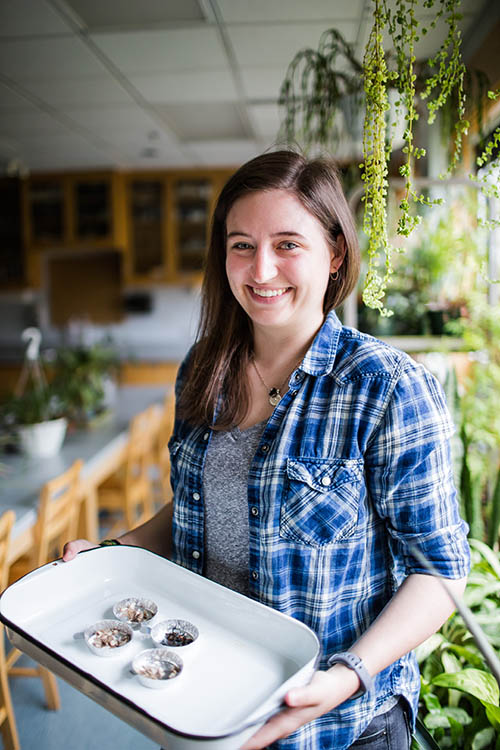
Darrian_Washinger
Since their introduction to the Island in the 1900s, moose have become commonplace in Newfoundland diets and landscapes. The impact of these large herbivores on the natural environment is significant and, according to Darrian Washinger, may indirectly alter the activity of other mammals, like bats.
Darrian is a Master of Science student in the Boreal Ecosystems and Agricultural Sciences (BEAS) program. Working under the supervision of Dr. Erin Fraser, she is studying the relationship between moose-altered landscapes and bat activity in Gros Morne National Park. Darrian’s research is being supported through a funding agreement between Dr. Fraser and Gros Morne National Park.
Moose, like many large herbivores, can drastically change local vegetation. In Gros Morne, for example, the hyperabundant moose populations have precipitated the conversion of insect-disturbed forests into open meadows, also known as ‘moose meadows’. "We hypothesized that bats and insects would use moose meadows differently than regenerating or mature forest stands”, notes Darrian. “We predicted that reduced vegetation in moose meadows would result in lower insect biomass and, subsequently, lower bat activity."
To test this hypothesis, Darrian and Dr. Fraser acoustically monitored bats and collected nocturnal insects from four habitat types. They found that insect activity was significantly different among the habitat types, with moose meadows having the lowest insect biomass. However, contrary to their hypothesis, bat activity was not significantly among habitats.
To further explore their findings, Darrian and Dr. Fraser generated generalized linear mixed models to test the effects of three different sets of variables – vegetation, environmental, and insect – on bat activity. Findings here suggest that vegetation structure is the most significant driver of bat activity, given the data set. "This may still indicate that forest conversion by moose impacts bat activity", explains Darrian. The next step for her research is landscape-level analysis using ArcGIS software.

From left, MAEP students Natasha Pennell, Earla Smith and Darrian Washinger at an event in support of the Grenfell Waste Management Committee.
Outside of her research, Darrian is an active member of the Grenfell Campus community. She is Volunteer Coordinator and President of the Grenfell Waste Management Committee (GWMC), advocating for sustainable and innovative waste management solutions. "Sustainable waste management is the center of my life on campus" she says.
Over the last two years, the GWMC has been instrumental in the development of recycling, composting and EcoBrick initiatives on campus. "We’ve diverted 43 pounds of plastic into EcoBricks. EcoBricks are being used as a reusable building material globally, so we’re tapping into a world-wide community initiative." she explains. "The end goal for our EcoBricks is to build a structure, like a bench in the atrium, to show the plastic waste we’ve diverted." The Grenfell Waste Management Committee has also established the Grenfell Green Fund. Money collected through recycling is contributed to the Green Fund and is accessible to any campus group hoping to host an event that is focused on sustainability.
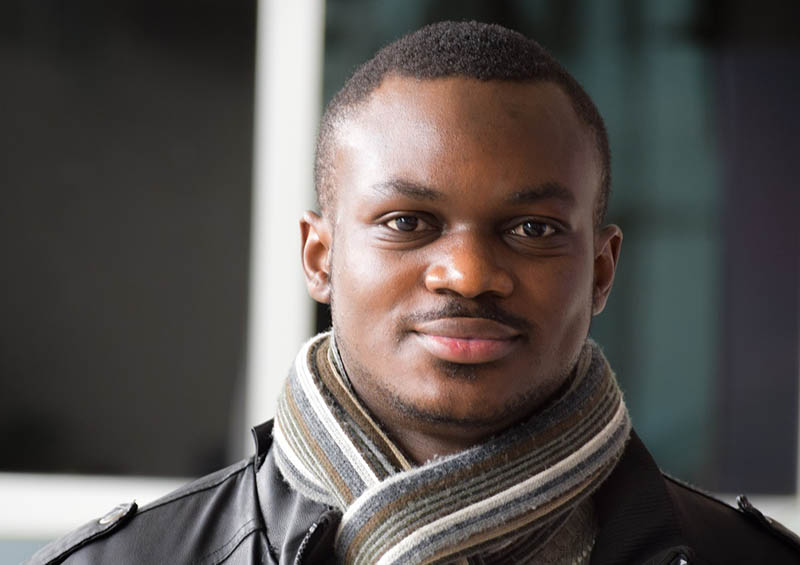
Richard Nyiawung is an African Leaders of Tomorrow Scholar.
The African Leaders of Tomorrow (ALT) Scholarship commemorates the social justice and equity efforts of the late Nelson Mandela. The program is jointly funded by the Mastercard Foundation and Global Affairs Canada and is coordinated by the Canadian Bureau for International Education (CBIE). Through the program, young African professionals receive full scholarships to pursue a master’s degree in public administration, public finances, and public policy in Canada.
Since 2016, six recipients of the ALT Scholarship have chosen the Master of Arts and Environmental Policy (MAEP) program at Grenfell Campus, Memorial University to complete their studies. These scholars have come to Corner Brook from Zambia, Cameroon, Rwanda and Ghana.
Hailing from Cameroon, Richard A. Nyiawung joined the MAEP program in 2016. For his master’s thesis, he chose to focus on Transnational Governance of Fisheries certification schemes in Africa, under the supervision of Dr. Paul Foley (Environmental Policy Institute, Grenfell Campus).
"My experience as an ALT scholar in Canada directly aligns with and supports my career plan for back home. Focusing on ongoing fishery certification initiatives in Africa, I would like to acquire, share and learn from professionals about existing certification challenges from both sides of the Atlantic Ocean."
Richard’s research got him an invitation to an expert consultative workshop on the formulation of a management strategy for inland fisheries and water bodies. The workshop was hosted by the African Union-InterAfrican Bureau for Animal Resources (AU-IBAR). He also presented at the 3rd World Small-Scale Fisheries Congress in Chiang Mai, Thailand.
Richard completed his thesis in 2018, titled: New environmental governance interventions in the Global South: fishery improvement projects in the African context. He is now a PhD student in the collaborative PhD program in Geography and International Development Studies at the University of Guelph under the supervision of Dr. Philip Loring.
For more on another of our ALT scholars, Sylvester Kong please click here.
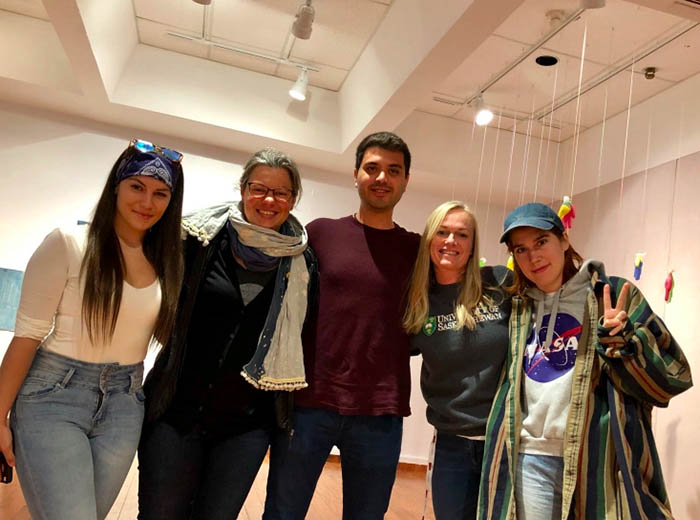
From left, Chantal Pennell, Anie Toole, Ardalan Hamedi, Lorna Conquergood and Yalitsa Riden; Photo by Pamela Gill
In 2018 Grenfell Campus, Memorial University, put the finishing touches on its Master of Fine Arts in visual arts (studio).
The program involves an on-campus intensive during May and June of the spring semester followed by fall and winter terms completed in students' home communities or at another campus of Memorial University with distance learning supervision and contact. Students return to Grenfell Campus for a second on-campus intensive next spring, with their final projects being presented during the second fall or winter term at Grenfell Campus.
"Our program is shaped by graduate students who seek a flexible delivery model and wish to engage in graduate research at more than one location: in their home and/or at a number of Memorial University Campuses or locations," said Cameron Forbes, assistant professor of painting and drawing and graduate officer of the MFA in visual arts (studio).
The first five students come from many different walks of life:
Lorna Conquergood of Saskatoon, Sask., has a background in teaching visual arts in the school system as well as acting as a program guide for the Remai Modern museum in Saskatoon. She traditionally works with oil paint, producing large scale paintings but is also delving into smaller scale sculptures. She hopes to explore place-based ideas of home, and "what makes a home."
Ardalan Hamedi of Iran has an architecture engineering background. He has employed diverse materials such as brick and concrete while using painting, sketching, documentary and photography to connect with architecture. He plans to continue this practice by creating a photographic installation related to architecture and design. Newfoundland and Labrador appealed to Ardalan because of the similarities to his feelings of living in Iran, which politically, is extremely isolating. He said:
"It's interesting to have this experience – the lifestyle inside one island."
He plans to make something here that is local, using the "arts of this land" to reflect on the province's cultural individuality.
Chantal Pennell, meanwhile, hails from Curling in Corner Brook, NL. Following her graduation from Grenfell Campus with a BFA (visual arts), she ventured to Ontario to pursue an MFA, but when she heard that Grenfell’s MFA was off the ground, she knew “I needed to come back.” Through the exploration of her Mi’kmaw background, she hopes to make a connection with the environment through her drawings, photography, and sculptures.
Finally, Anie Toole of Ottawa, Ont., uses an interesting combination of math and craft to create patterns and sequences to construct 3-D textile weavings. She said she researches the "representation of weaving," and our relation to cloth. Explaining that while we may not realize it, weaving is everywhere. Her research in handweaving is a mixture of textile history and computer programming.
For more information about the MFA, check out www.grenfell.mun.ca/mfa.
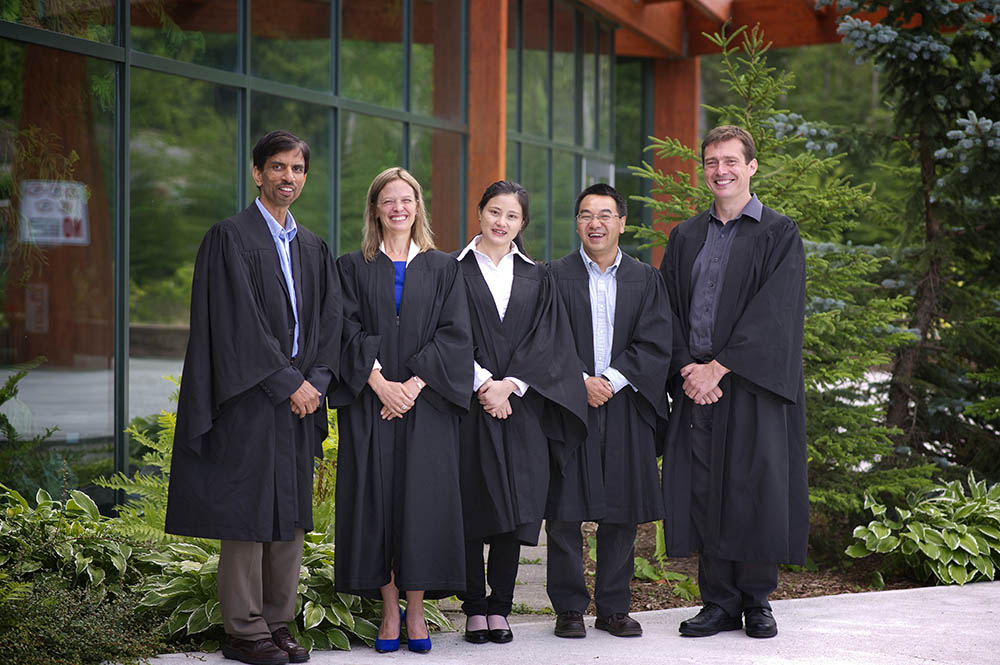
Dr. Mei Wang’s PhD defence in 2017. Dr. Wang, centre, is seen here with her exam panel: from left, Dr. Mano Krishnipallai, Dr. Kelly Vodden, Dr. Jianghua Wu, supervisor, and Dr. Dmitry Sveshnikov.
The population of PhD students at Grenfell Campus is growing. Drawn by the expertise of our faculty, students enrolled in PhD programs at St. John’s Campus are choosing to complete their research here at Grenfell. In 2018, at least 20 PhD students were supervised by Grenfell faculty, working on projects ranging from agricultural sciences and subatomic physics to community sustainability and nursing.
Grenfell Campus held its first PhD defence in 2017. Dr. Mei Wang, a student of the Environmental Science program based in St. John’s, conducted her research in western Newfoundland under the supervision of Dr. Jianghua Wu (Memorial University, Grenfell Campus). Her PhD dissertation is titled, From a boreal bog to an abandoned peatland pasture: The effect of agricultural management and abandonment on the greenhouse gasses fluxes, carbon balance and radiative forcing of a boreal bog in western Newfoundland, Canada. Dr. Mei Wang is now an associate professor at the School of Geographic Sciences, South China Normal University, Guangzhou, China.
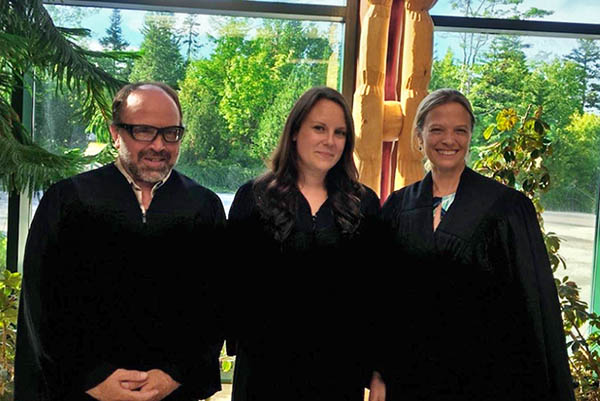
Dr. Sarah Minnes’ PhD defence in 2018. Dr. Minnes, centre, is seen here with co-supervisors Dr. Robert Scott and Dr. Kelly Vodden.
Dr. Sarah Minnes, a student of the Interdisciplinary PhD program based in St. John’s, successfully defended her dissertation in 2018. Dr. Minnes was co-supervised Dr. Kelly Vodden (Memorial University, Grenfell Campus); Dr. Robert Scott (Memorial University, Grenfell Campus); Dr. Nick Novakowski (Memorial University, Grenfell Campus); and Dr. Maura Hanrahan (University of Lethbridge, formerly at Memorial University, Grenfell Campus). Her dissertation title was: Enhancing source water protection in rural regions: Exploring the role of capacity and collaborative watershed governance in rural Ontario.
Both scholars have gone on to publish their work in journals such as Agricultural and Forest Meteorology, PLoS ONE, Canadian Water Resources Journal, Water, and Journal of Rural and Community Development.
Whether it’s to assess models for collaborative governance or to investigate the properties of a boreal bog, PhD students are finding a space for themselves at Grenfell Campus. And more graduate programs are on the horizon. A Master of Fine Arts Program (Visual Arts) began in May 2019 and several new programs are in the development stage, including a Masters in Management, a Masters in Applied Geomatics, Masters in Applied Literary Studies, Masters in Fine Arts (Theatre) and Grenfell’s first PhD program – PhD in Sustainability Science, followed by a proposal underway for a PhD in Boreal Ecosystems and Agricultural Sciences.